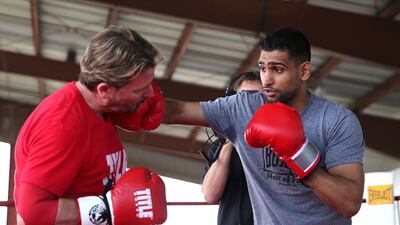On Wednesday, one of the most contentious decisions in recent Olympic memory was passed when the International Boxing Association (AIBA) voted to allow professional boxers to compete at the Rio Games this summer.
It wasn’t even a close run thing, with 84 of 88 member federations voting in favour, none against, and four abstaining. Given the widespread opposition to the proposal, both before and since the vote, it would seem quite remarkable the lack of resistance it faced.
AIBA’s argument, delivered by the body’s president, Dr Wu Ching-kuo, was that if all the other sports participating at the Olympics are allowed to field top-class athletes instead of amateurs, then why shouldn’t boxing?
“We want the best boxers to come to the Olympic Games. It is AIBA’s 70th birthday and we want something to change — not after four years, but now,” Dr Wu said.
“It is an IOC policy to have the best athletes in the Games and of the international federations, AIBA is probably the only one without professional athletes in the Olympics.
“When I took over the presidency in 2006 I made it very clear the term of amateur is not really relevant because when you look now at all the Olympic sports, who is really amateur?”
Were Dr Wu the head of almost any other sports body, he would be making a compelling and justifiable case, but boxing is not like any other Olympic sport, nor the difference between amateur and pro ranks so vastly separate.
Looking at the logistics for a moment, amateur boxing focuses much more on points scoring, and yes, while there are knockouts and stoppages, they are far less common than in the professional scene.
Strategically speaking, an amateur approaches a bout with the aim of winning on the cards, a professional approaches a bout with the aim of causing serious damage to his opponents. This isn’t a case of opposing tactics, this is almost different sports. It just so happens that both wear gloves and attempt to land punches on their opponents.
It is the concern over health and safety that has most people criticising the decision. Even if the majority of amateurs in Rio possess superior skill sets to their professional counterparts, a pro’s ability to land knockout blows can prove damaging, and as the sport has seen too many times, even fatal.
Let’s not forget, most of the boxers that participate at the Olympics are either youngsters coming through, hoping to use the platform as a springboard to a professional career, or exactly what they are called — amateurs; men and women who box part time and still hold down jobs. Can anyone really think it wise that a teenager or a part-timer share a ring with a battle-hardened pro? It’s also worth remembering that headgear has been eliminated from the Rio Games.
People don’t ‘play’ boxing the way they might play basketball or baseball, and there’s a reason for that; it’s dangerous.
Beyond the safety aspects, the introduction of professional boxing into the Olympics serves only to further dilute what the Games should represent.
The idea of the Olympics being exclusively amateur is, of course, long gone, but what should be a pre-requisite for any sport is that Olympic gold represent the finest achievement in that field.
For amateurs, winning the World Boxing Championships is massive, but Olympic gold is still the pinnacle. For pros, it is, has been, and always will be, about world titles. The same criticism can be levelled at the inclusion of golf, tennis, and football, but let’s stick with boxing for today.
Dr Wu said the overriding reason to allow professionals into the Olympics is to attract the “best boxers” to compete. Having famous, top-class fighters in Rio, the argument goes, will help shine a larger spotlight on the sport and help its expansion.
There’s a pretty major flaw in that argument though, Dr Wu. The sort of professionals you might hope to attract to the Olympics are unlikely to be interested in fighting for free now that they earn big bucks from the fight game.
Is Saul Alvarez, Gennady Golovkin, or Anthony Joshua — arguably the biggest stars in boxing right now — going to pass up the chance of millions in order to fight at the Olympics? Of course not, and that may be an extreme example, but the point is, if AIBA can’t attract the sort of recognisable pros to Rio that will raise the sport’s profile, then it feels a wasted exercise. Amir Khan has expressed an interest, but in all seriousness, at this stage of his career, it seems highly unlikely.
So what Olympic boxing could be left with is a bunch of middling pros and journeymen heading to the Games — via a qualifying tournament in Venezuela — to take on young or part-time amateurs in the hopes of rebooting their careers.
Not exactly what the Olympics is about, is it?
Follow us on Twitter @NatSportUAE
Like us on Facebook at facebook.com/TheNationalSport

